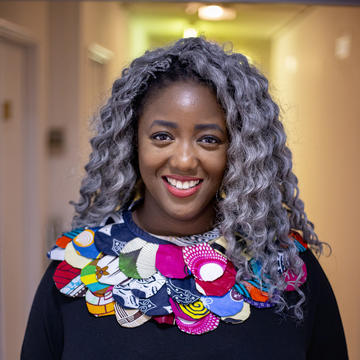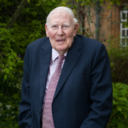ANNE-MARIE IMAFIDON (KEBLE, 2006)

ANNE-MARIE IMAFIDON (KEBLE, 2006)
The CEO and Founder of STEMettes (a charity designed to get more women into STEM careers) talks Oxford, being a woman in tech and what she sees for the future
Published: 8 February 2022
Share this podcast
The Alumni Office's Harriet Packer interviews Anne-Marie Imafidon (Keble, 2006), the CEO and Founder of STEMettes (stemettes.org).
During the conversation Anne-Marie spoke about her time at Oxford, being part of 'Britain's brainiest family' and how she realised that she was a woman in tech.
She spoke about the reason for creating STEMettes, where she wants the company to head towards and what she sees in the future for the tech industry.
**This interview was originally recorded in 2019**
00:00 Today we are delighted to welcome Anne-Marie Imafidon, she is the CEO and Founder of STEMettes, a social enterprise which encourages girls and young women from ages 5–25 to pursue careers in STEM subjects. Welcome Anne-Marie we’re so happy to have you today, let’s dive straight in with what initially drew you to studying at Oxford?
So it’s a funny story how I came to want to be going to Oxford. So my parents have always been super supportive, and said, you know, ‘Do the best, you are the best, be the best.’ But my desire to go to Oxford came about aged thirteen. And there was something called Connexions at that point, and so I did this career survey and answered all these questions: Do you want to work outside? And all those kinds of things. And it said I should be either a management consultant or a systems analyst. And I’d never heard of either of them at that point, and never met either of them at that point. And Connexions told me that you’re sixteen times more likely to become a management consultant if you go to Oxford. And in that moment, the deal was done.
01:13 So the deal was done in where you wanted to study, what was the application process like?
So applying for Oxford was a bit of an experience. So I applied, I think I applied three times actually. So I had my A Level... I had enough A Levels fairly early on to be able to apply to Oxford and come up to Oxford. And so when I finally came up, I’d applied to Keble to do maths and computer science. Back then I hadn’t seen it... I’m old I guess, so back then it was all paper applications. And there was like a separate green form, or blue I think it was for Oxford. And I knew I wanted to do maths and computer science, but I thought I wanted to go to Hilda’s. But Hilda’s didn’t do maths and computer science. And so, for some reason, it defaulted to Keble in the system, and so that was how I ended up applying to Keble. The process was that we had to go up to Oxford for a weekend or for a couple of days. And because I was doing maths, I had to sit the maths entrance paper in college as well as doing interviews. And, do you know, I think I might have blocked out most of it. I remember it happened. But I remember... I don’t remember feeling necessarily the greatest after it. But it was fine, because I think we had to go into interviews anyway. I had five interviews. So three at Keble and two at Magdalen, because you get allocated a second choice college and it was Magdalen. And the maths tutor at Magdalen looked like Arnold Schwarzenegger. So that was a bit of a fun experience, being asked a series of maths questions by Arnold Schwarzenegger in Magdalen, of all places. And I was late to every single interview I had at Keble.
03:08 So in spite of that you obviously were accepted, what did that feel like?
It’s kind of crazy. It was like, it was like being one of the X-Men. Because we didn’t tell everybody. Not everyone knew I’d applied. And then not everyone knew I got in.
03:28 Do you remember your first day?
I remember my first day. I remember moving into college, and I remember college was not set up for people to move in in cars, in 2006. So I remember it being a logistical mess actually trying to drive round. I remember seeing my room. I remember meeting a couple of people that were living on my corridor. I remember how quiet it was my first couple of nights, because I was quad-facing. And Oxford is not the A13 in London, and so it was very quiet. And I remember actually being really upset my first night, because I was not at home, like my best mates weren’t there. And everything was about freshers’ week and the going out and all that kind of stuff. And there’s elements of that that really wasn’t my thing necessarily. So I remember, and she still remembers... I remember being on Skype to my best mate, almost continually for the first couple of... for the first night actually. And then we’d do it every... we’d do it a couple of the other days.
04:37 Did you feel any pressure in coming to Oxford?
So weirdly enough, being at Oxford I didn’t really feel the pressure. I think, you end up... so that first day, first night I was on Skype the whole time to my best mate. The next day we had lunch in hall or whatever, and you got to meet a couple of the freshers. And turns out that one of... someone that I then, I ended up getting to know within that twenty-four hours, she had a twin sister at John’s, who had been talking to someone that’s having the same experience as me. And so the third day of Oxford till the end of third year, myself and my best mate from John’s were inseparable. So actually, it didn’t last very long, that whole trying to find my feet. Because then the two of us did it together. And so there were lots of freshers and it was like that way and we like found a foam party and all this stuff where we kind of just did our own thing.
05:34 How was it, graduating at 20?
It was kind of cool. So graduating was amazing. You’re not really allowed to do it, but you have trashings when you have your last exam. So finishing my last exam was amazing. I think it was one of those things where I never felt the pressure, but I always had a sense of, ‘This is the Oxford. Anne-Marie, you’re at the Oxford and you’re doing the maths and the computer science at the Oxford.’ I think finishing, it was almost as if, ‘Well that’s something that has now happened and no-one can ever take that away from you.’ Which I think, for my confidence, and for my sense of self, it’s something that... and even from doing the earlier exams, it’s kind of, was like a new addition to that kind of list of things that no-one can ever take that away from you. So for example, doing the GCSE aged ten, like there was an exam board – the person at the other end didn’t know I was ten years old when they marked it, and when they sent the grades back. And so with Oxford it was a similar thing, where that’s marked, but that happened, that’s the institution, like you can go back and find my papers and find what I did. And so finishing was great, because it was like, ‘This is it. I’m done now. I have this Master’s. I’ve got the job, I’ve got everything else. But that’s something I can say I did, something that’s independently verifiable. ‘It’s really funny because it’s like it’s a thing that happened. As incredulous as it sounds, as crazy as it sounds, that this black young girl from East London, who lived in Nando’s, did her... revised for finals in Nando’s. Because RSL was just far too packed... Radliffe... RSL... I can say RSL, right. Because RSL was far too packed. Like that was a thing that she did, that then happened. And kind of cool.
07:10 You touched on it a little bit there, but do you feel that there was a sociological element to your journey?
So I think the sociological element of my journey is only something that gets to you the older I get. So being there, that was what was happening. So I’d never felt like that black young girl from East London. I think it’s something that, looking back, is a credit to Oxford, a credit to my college, and particularly a credit to my senior tutors. So the ones that took me on anyway in the first place. But I was never made to feel younger than everyone. I was never made to feel different from everyone. In fact, quite the opposite – sometimes I felt like, I mean, I always joke that kind of mathematically, the average doesn’t really exist. But I always felt like one of the more normal people in the room. So one example – my senior tutor at the time, who’s sadly now my late senior tutor, was the president... was the senior tutor like sponsor of the University’s bell ringing association. I’ve never heard of bell ringing as a thing before, didn’t know that that was a hobby, let alone something that could be a student society. In the year above me, one of the students was a bell ringer, and in my year someone was a bell ringer. And so it’s really interesting being sat in that tute, with kind of, ‘We rung this bell’ whatever as the opening thing. And me being sat there, being like, ‘Okay. They ring bells. No-one else outside this room that I’ve ever met rings bells.’ Being in that environment that was so small as well, so the tute system, does mean that as long as you’re decent people, it’s quite a safe space, where you don’t get to... no-one has time to bully other people or wind other people up. At least I found in my experience. Because you were there to defend the solutions to your problems, and ultimately the bell ringing and everything else didn’t really matter. And so I was never really made to feel like other.
09:08 In previous interviews you have spoken before about taking apart your parents’ VCR, I was wondering if you could you tell us a little bit more about that.
I like taking things apart. I am a very curious person. And I think when I was younger, things were what I was curious about, rather than people. So whether it was VCRs, whether it was pens... like I built a PC at one point. So for me, just understanding, oh my goodness, when you see that box – these are all the things that are happening inside. And here’s how they’re connected together, and that order means that that is a thing that then happens. Like it’s, I mean, we don’t appreciate it enough. When you think of a mobile phone, it’s so small and there’s so much that you’re able to do. But the person that made that mobile phone didn’t necessarily intend for all of that to happen. So when you take a photo, they didn’t know that that was the tree you were going to be taking a photo of. And yet the technology works. So for me, there’s something still now that’s so beautiful about you want to understand it, you take it apart, you see the bits of it, and then you have a better understanding of what it is. And that works all the time. So I always say two plus two was four for the first person that realised that. There are people being born now today, as you’re watching this, for whom two plus two will still be four. How crazy is it that that’s a constant? That once you understand it, that will always be. And so for me, I had that curiosity in that, and didn’t even notice that people weren’t like that. But also that other people weren’t as interested in just the things. Like that’s a pen. And there’s a spring in that pen, there’s the ink in that pen, there’s a nib in that pen, there’s a top in that pen. And they all follow the same principle. And it’s so normal that I could go out and buy a pen now and I already know to click it. And so to me, that’s something that I still find kind of... it’s still interesting, still cool.
10:56 So what did your parents say?
So my parents, fortunately they didn’t see it as destructive. I think, so if you think about play dough, think about Barbies. I think there’s only a certain level of things that you can understand in a play dough or understand in a Barbie. Or even a Lego. It’s about the creativity – not necessarily about understanding how the things work. Whereas I think they know it because it’s that whole thing of kids always ask questions, ‘Why, why, why?’ And this was a physical manifestation or a physical extension of... but when I put the video in, why does that work? Or why do I need to wind it? Or, you know, I almost remember, with the VCR the flap is always down, right. And so as you put the video in, you push it in, and then you see all these things inside. It’s like, ‘Wait, what’s going on inside? I want to be inside there’ kind of thing. So I think it was never destructive. It was never that I was breaking the VCR – it’s that I’m taking it apart, like I want to see what’s inside.
11:56 Do you feel like you’ve always had that innate want to understand things, did a little deeper?
Yeah. So I think it’s still part of me now is just wanting to understand things. And deriving satisfaction from investigating, understanding and then being able to apply those principles. So even playing with the web, which is something I was doing as well. Early days of the web, you’d have really basic websites and you’d have, you know, some would be that colour, you’d have marquee and scrolling text. And so it was great to say, ‘Okay, that’s the front bit, yeah, yeah, yeah, whatever. Let’s lift this up. Like what’s the tags, what have they got? And if I take that tag and copy it, mine will look exactly the same.’ So it’s not, it doesn’t know that you’re a kid, so yours is going to look slightly kiddy, whereas if I write something, as a ten year old or whatever, you can maybe see in my handwriting that it’s not an adult that’s done it. Or if I turn up somewhere, you can see it’s not an adult. Whereas, if I type that, you know, on the internet, no-one knows you’re a dog. And so there was almost this thing of, ‘I can make that.’ And like everyone else that made the VCR that I’ve never seen, or that made that website that I’ve never seen, mine looks as legit as theirs does. Even though I’m just me
13:03 And you were aware of that?
Yeah, very aware. I think it’s something that... kids are still aware. We still see it now, with the work that we do. Where these girls live on their phones, they live on apps, they live on Instagram. They’re, you know, using Snapchat, whatever it is. And so they have this sense that, ‘That thing is in my phone, I downloaded it from a legitimate source and there’s all this work that’s gone into it, or it’s legit.’ Whereas when they make their own apps that open up on their own phone and function the same way, there’s this, ‘Wait, the gap between me and the greats is not really that big. Because this is my thing, co-existing next to Facebook’s thing.’ So I think it’s still something now that... I don’t know if it’s innate to everybody, but a lot of people would love to have that sense where, it’s like knitting – if you knitted something, you’d assume your jumper would be rubbish. Can you imagine if you’re able to knit, you copy that person and it looks the same? How crazy do you feel? Like, that’s amazing. So I think the technology, and with math... that’s always been my thing where two plus two was four; it’s still four, it’ll always be four. Just because I’m me, and just because you’re you doesn’t mean that you’re going to get a different value of four.
14:10 So you and your family were given a title by Sky, can you tell can you tell us a bit more about that.
I’m the eldest child of Britain’s brainiest family. So the perspective I have is very different from what the rest of them have. It was a label given by Sky News. So we didn’t do the show or anything, it was more... yeah, Sky News were like, ‘Well she did that and she did that and she did that, and he did that. That’s kind of crazy, you all live in the same, under the same roof.’ I think for us... so personally, we’re quite competitive. And there’s three years gap between me and the next one. And there’s three years gap between her... the last ones and that one, and there’s five. But to us, there’s no gap, even though three years is a lot. And five years is also a lot. So if I was doing anything, they all wanted to be doing it. And to be honest, when someone first floated the idea of doing a GSCE... GECS, whatever it was, it sounded a bit like what my cousins were doing, and they’re four years older than me. And we always had this thing where there were certain things they were allowed to watch on television that I couldn’t watch. And certain things they were allowed to do in the kitchen that I wasn’t allowed to do. And so I was like, ‘Well, this is my chance to show them. Ha, I’m going to do a GCSE at the same time as you.’ So with my siblings, there was a similar kind of thing, where if Anne-Marie’s done it now, I also want to do it now. And frustratingly, we’re now all technically adults and it’s the same thing. Where before I know it, one of them has decided to do computer science at university. Or another one’s decided to set up their own initiative to help whoever it is. And we’re all adults now, so I can’t really say that they’re copying me. But I think it’s one of those things where we’re all incredibly competitive.
The funny thing about being Britain’s brainiest family though has been that we are all like the same father, the same mother. And so people think there’s something genetic about it. Whereas actually, over the years, there’s been lots of other people that we’ve helped, other people we’ve mentored, other people that we’ve been like, ‘Hey, here’s how to see maths, how to see the world.’ And it all kind of comes together. So it’s not necessarily a genetic thing; I think it’s more of basically, as an adult, don’t impose what you think the world should be like on kids. And two, children learn incredibly quickly. So if you just keep giving them things to learn from, and to see and to try out, that isn’t just paper-based, they will suck it up.
So I think, again the older I get, the more I realise this. But me taking apart the VCR player, if I was not in my parents’ house, there might have been someone who would have said, ‘Why are you touching that? Here’s a Barbie. Play with the Barbie instead’ kind of thing. Which just wasn’t the way that we were raised. I think there’s also an element of it was all girls and then there was a boy at the end. So there was nothing that the boys did and the girls did that, because there were no boys to do it, kind of thing. And so I think there’s quite a few factors that we had in the environment where it was, ‘Whatever you’re going to do, do really well.’
17:04 Moving forward a bit more into the present, how di d you feel about being a woman working in tech?
So I’ll be honest – I didn’t realise I was a woman working in tech until very recently. I had always done this computer science, mathsy thing, always been technical. Always been Anne-Marie’s thing, my thing. Didn’t matter that I was young, black, East London, whatever it is; always Anne-Marie’s thing. And so I would have done it for free. After doing that kind of career survey, I ended up doing an internship, actually just before I came up to Keble, at Deutsche Bank. And they put me in a team, a tech team that faced off to the HR department. And I thought, ‘This is amazing. I’m being paid to do this. I’m sixteen. One of these adults that kind of wears proper shoes and like a dress, and gets on the tube in the mornings.’ And I am sat at a computer all day, playing with technology and they’re paying me to do that. And there’s actual things that happen across the bank. And so I was like, ‘That’s crazy. I can do this. I can do this.’ And so obviously I was sixteen; I had to get my degree at Oxford first, to do that management consultancy thing. And so I kind of slightly shifted it. I was like, ‘Maybe I’ll do management consultancy for tech.’ And then by the time I left, I’d done internships and other things and had ended up deciding to work in a tech department at a bank, which was also Deutsche Bank, so I kind of came back full circle. And for me, I had a ball – I loved it, it was great. We were being paid really well. I was playing with computers all day and being paid really well to do that. I was being listened to. We had sort of interesting problems to solve. And I was never made to feel like other again. And it was one of those things where, looking back now, when you look out on a sea of pale, male faces... pale, male, stale faces, you don’t see yourself in that room. You just see everyone else in the room. So I never had this odd one out game that I was playing. ‘Cause I couldn’t see myself there. I’d go into the meeting – either I’d be running it or I’d be supporting someone else there, or I’d be just in the meeting on my own back. And there was never a, you know, ‘As a woman, de, de, de.’ It was just a kind of, ‘Okay, Anne-Marie, what do you think?’ Or, ‘But Anne-Marie said that last time.’ Or, you know, ‘This is an idea you’ve had or this is something you’ve studied’ or whatever it would be. So I never felt like a woman. And so it wasn’t until I was sent to speak at a conference on behalf of the company, at an event that was, had three and a half thousand technical women in it, that I then realised, ‘Oh my goodness. This is what it’s like when I’m talking tech, but I’m not in a room with middle-aged white guys.’ And nothing against them – like my managers have been amazing mentors and everything. Still now helping me out. And you know there were middle-aged white guys who were my tutors. So you know, they’re not the enemy. But for me it was like, ‘This is so different. This is such a different vibe. It’s such a different environment. Different interactions.’ We’re talking about the same technology. How crazy is it that I’m the only person like this where I work? Or I’m one of a few on my floor. You know, looking back at certain things – did that person react that way in the meeting because they were looking at me like this? So that was when I realised that I was a woman in tech, and one of few. And realised that there was probably something I could be doing about it. Simply because I was really enjoying it, had been able to buy a flat in London. Like amazing things had been happening. And I then realised it was strange that there weren’t more people like me enjoying that.
20:37 You were obviously working when you had this realisation, can you expand on it a little bit more.
I’d done the internship aged sixteen, under a quota per se, where I was part of this scheme that had taken black and minority ethnic kids from around London. Had basically, basically over the six months been like, ‘Don’t be a statistic. Don’t be a statistic’ kind of thing. And so we’d ended up doing this internship. But it was really funny, because doing that... maybe I was there as a quota, but I didn’t need to be hired back in under a quota. Or they didn’t need a quota to know that they should have me back. But I will say, there are... looking back at the corporate world, and looking at quite a lot of different spaces now, I think there’s an element of if you’ve only ever had middle-aged white guys in that position, then hiring middle-aged white guys is really easy for you to do. But realising that it’s not that they’re middle-aged and white guys and that’s why they should be in that position. But that maybe they have skills that other people who don’t look like that also have, and could also be in that space, is why we then end up needing the quotas. And this is something that I think, across all systems, you know, this notion of things being a meritocracy. Because we’re human beings and we’re not those algorithms and we’re not those VCR players, actually meritocracy, I’m not entirely sure could really fully exist or function when you’ve got human beings involved. And so for me, quotas is one of those things where it’s actually a failure of the system that you have the quota, and the process, not even necessarily a failure of the person themselves.
22:10 Obviously now the world is slowly but surely trying to be more sustainable and STEM research is changing so rapidly, what do you think the impact of that will be on wider industry?
So the research, STEM research that’s gone into sustainability and into having that as a priority, at the forefront of, from a STEM methods, has been a long time coming. But finally is going to come to the forefront, I think. I see this with the girls, actually we work with the parents, that people are... you know, when you look at climate change and everything else, people are a lot more aware of what the issues are. They’re a lot more aware of what we should be doing, lot more aware of how their decisions in the small impact what will happen sustainability-wise. What we’re seeing across industry, though, is it’s kind of lagging slightly behind. So there’s always this tension of profits versus doing the right thing. And it’s weird, because it doesn’t have to be a tension: it’s not either or, they’re not mutually exclusive. And so what I’m seeing more of is where you’ve got younger people in these organisations, they’re almost emboldening the kind of closet environmentalist and the closet sustainability people within the organisations, to then say, ‘Enough is enough. Our policy now is we will not use single-use plastic across what we’re doing.’ Or, ‘Enough is enough. Our policy is when we do this research, here are the methods we’re gonna use to ensure that we’ve got sustainability embedded amongst all the innovations that we have coming forward.’ But it’s a systematic change, rather than something where we have this growing movement of people becoming vegan, where that’s a decision they made. It’s taken a while now for the giants to then come and say they’re gonna give vegan options. And I think we’re seeing something similar in industry. Where employees are making decisions, and it’s taken a while now for companies to then shift round and say, ‘This is the sustainable way for us to make money and here’s what we’re going to do.’ I think the voices... so we have voices like Martha Lane Fox’s right at the top of industry, who now won’t give a tech talk without mentioning climate change and how that’s core to it. And she’s actually, ‘You won’t have anywhere to do your STEM research if we don’t take this more seriously.’ I think that’s also helping, but it’s something that needs to be systematic. And corporates are doing bits to move that forward. I think the frustrating thing is that, often with things like this, you need the government and public sector to push them. But talking of blunt tools, the government sometimes has some of the bluntest tools that actually do more harm than good. And so there’s been a kind of frustrating space actually where, you know, against the backdrop of Brexit and all these other things they could be funding, it’s not become something that they’ve been able to actually make good enough change for. And industry, for once, is moving quicker than government is.
25:00 Should we be looking towards industry to create that space?
I do a fair amount of political work around the future of work and good work and the fourth industrial revolution, as we’re calling it. So all these new technologies that are taking over the way we live, the way we work, the way we’re going to interact with each other. And what... and what I’ve already seen is that you can’t wholly trust industry to drive good change. Because at the end of the day, their number one priority will always be profits, always. So anything needs to be able to align with that. And when we look at policies that are being drawn up, when we’re looking at even just legal implications and legal frameworks, where you’ve got a really big hand of industry, they’re not doing everybody good. So I don’t... ideologically, I don’t believe in the power of business or capitalism itself to solve all of our problems. I do believe that you need the government, you need the public sector. I was challenged a little bit on stage last week with the chief economist of the Bank of England for saying that I love... because we were having a kind of fireside chat about the role of the third sector in the fourth industrial revolution. I was challenged a little bit for saying that I’d actually... my hope would be that we don’t need the third sector. That kind of between public and private, we can sort it all out, and we don’t need to have charities solving problems that have been created by government or industry. Which is a kind of rather utopian way of looking at things. But ultimately, that’s what I... I run a charity because there’s a problem that’s been created. That’s been created between industry and government. And it’d be nice if, if we’re gonna be smarter with data, making better decisions, being more efficient, being more sustainable, that then some problems just disappear. And we don’t need to say, ‘Gonna pour all this money into charity’ or whatever it might be.
26:57 Do you feel there’s any kind of risk factor with how fast tech is moving towards embodying science fiction?
What I always end up saying to people is when you think of science fiction... and I kind of show this image that’s almost like a scene of the Guardians of the Galaxy, where you’ve got these kind of silver buildings and flying cars and futuristic looking things, I say to them, ‘Do you remember Knight Rider? He talked to the car. We talk to cars now. Science fiction is actually science reality. The future is already here. Maybe it’s not evenly distributed, but it’s already here, whether you like it or not.’ And so I think there’s so much... given that it’s here and all the bad things that we can see, all the unintended consequences, all the moving of elections and everything that we can see that’s going on, I... the only hope I have for technology and the technology industry is the work that I’m doing and the change that I’m seeing. Where we’re having lots of different people being empowered by that technology and being able to create technology. And there are so many examples of... from seat belts killing women and children initially, to the period tracker. That God forbid you have a period that’s longer than ten days – doesn’t allow you to track your periods beyond that. Where we’ve got these literal examples of: you don’t have the right people in the room when you’re building this technology. And so you’re having these unintended consequences. Even something like social media. If I said to someone in the street, ‘What if anyone could say anything to you?’ Nine times out of ten... maybe even I can say five times out of ten if they’re a woman, you don’t want someone to just be able to say what they’re already going to say directly to you. Why would I build a tool that does that? And so just... it wouldn’t have been... if you could have asked people that weren’t just dubras, and they could have said, ‘This is a shocking idea.’ On the flip side, a social network allowing people to communicate is not a bad thing. Allowing them to communicate and centring on ideas, not centring it on human beings, could have been a better way for us to have social media grow up, right. And so it’s just a difference in perspective that we need, where we then don’t unwittingly, you know, create robots that will kill us. Because that’s ultimately what I think is going to happen.
29:12 You’ve mentioned working with your girls, which is obviously part of your charity STEMettes. Can you tell us a bit more about it.
STEMettes was a response to me realising that I was a woman in tech and that I was part of a shrinking minority. So when we look at technology, when we look at physics, when we look at more the kind of physical sciences, we have this dearth of women entering the industry. We have a dearth of girls choosing those options academically. And we have this notion that it’s just not something that females do. And so STEMettes was a response to that, to say, ‘Well okay, they do it. If TV isn’t showing you, if the movies don’t, if the press isn’t talking about them, they’re there – they’re doing it. But also you’re missing out on this party basically. Where every day we get to play on computers and people pay us ridiculous amounts of money to do it. And there’s nothing wrong with you, that you can’t be a part of this party. But also this party is gonna take over our lives. Our jobs are all going to robots and your mortgage decisions, and all these things, are happening in technology. And so you really should be there, shaping part of it.’ It was about removing barriers and changing perceptions of what it was to be in STEM. And I think, when we talk about barriers, often the perceptions and the stories and the awareness of what’s available, in itself is a barrier. And so that’s what we kind of ended up working on.
30:40 How do you think those sort of barriers have changed since you launched STEMettes? Have you seen a difference?
So we’ve definitely seen a difference in the girls that we’ve worked with. We measure their perception, we measure their awareness of what’s available. We measure their network within STEM. We measure their confidence, and we measure their sense of having an improved sense of knowledge. And what we see that’s different with them is it ends up ultimately being a confidence, a self-confidence thing, a self-esteem thing. And then it ends up being a bit of a lighting a fire under them, to then go and explore more. So we see ourselves as almost a gateway drug into some of the other things that are available. As well as a safe space where we can suspend reality a little bit, and they can see it for what it really is, without the encumbering of all the conditioning and all the stereotyping and all the rest of that. What we’ve seen wider than that has been... not just credited to us, but has been an acceptance by at least the technology industry that this is a problem they should solve. So initially when I started up, people were saying, ‘You shouldn’t do girls only. You shouldn’t do this, no, no, no.’ Whereas now it’s, ‘Yeah, we should be doing. We should be starting when they’re young. And this is a problem.’ And you have to admit you have a problem before you’re able to solve it. So I think we’ve moved in that direction. We’re still in this phase of kind of more chat than action. And lots more chat than funding for action. But we’ve definitely seen a difference in the behaviours of some of the companies that we’ve worked with. We’ve seen a difference in the perspective of a lot of the parents that we’ve worked with. And we’re also seeing a little bit more of a conscious effort from the press and the media to undo some of the bad work that they’ve been doing.
32:18 How do you envision the future for STEMettes?
So for STEMettes as an organisation, I’ve always said I want us to be made redundant. I don’t want it to be a charity that lasts for ever; kind of want to solve that problem, be done with it. I am aware that we’re not gonna, you know, wave a magic wand, as big as that wand may be, and the entire problem disappears. But I think we’re kind of honing in on just one thing where we’re like, ‘From now on, you know, anyone that’s female and owns land can vote.’ And so we kind of, we drop it here. So for us, what we’re looking at actually is around certification, around perception and then around influencing kind of macro level. So we’re wanting to empower girls and young women to get the right kind of certification. One thing that we’ve noticed is there are several reasons why girls aren’t choosing subjects; it’s not just their availability, but often it’s also schools trying to game the system. And kind of, you know, making decisions on behalf of individuals that are in the school’s interests, but not in the individual’s interest. Again, coloured by the stereotyping, coloured by this conditioning. Coloured by the perceptions of what they think comes next. But we’re also just wanting people to be able to have that science capital. In the same way that we talk about cultural capital – just allowing the girls to meet a scientist, allowing them to see this engineering firm, allowing them to try and build an app, is the other thing we’re wanting to almost kind of capture a generation with. They’ve got to do that in a STEMettes environment, that it’s free, it’s fun, there’s food, there’s, you know, Billie Eilish or whoever playing in the background. And it’s not about it being an academic thing; it’s about it being about life. So similar to what we have for X Factor or dancing, it’s not because you did GCSE dance that you’re a top dancer. And we’ve got to have the same approach with the technology sector.
34:09 We ask this at the end of every interview, how did Oxford change you?
I grew up at Oxford. And I became an adult at Oxford. And I think it was almost my finishing school. I learned what life was like for different parts of society that I hadn’t encountered before. And I think Oxford gave me a new perspective on the world.
Thank you so much for your time today Anne-Marie, it’s been such a pleasure talking to you. If you’ve enjoyed this QUADcast then be sure to check out our others on our website www.alumni.ox.ac.uk




































